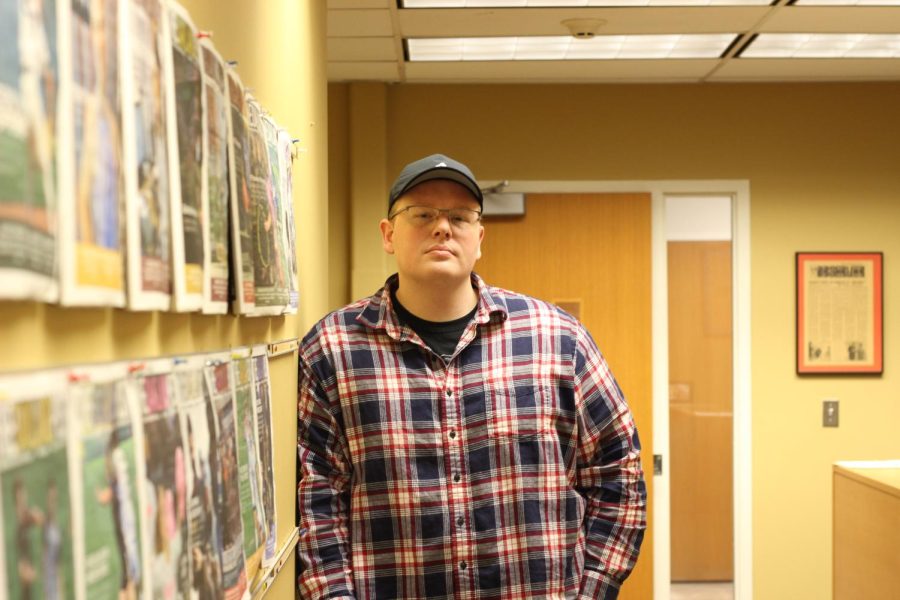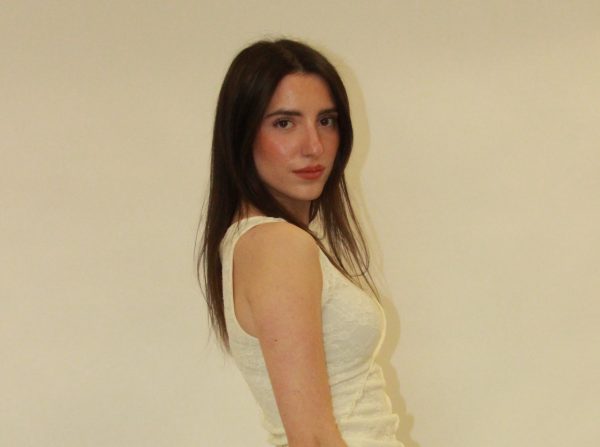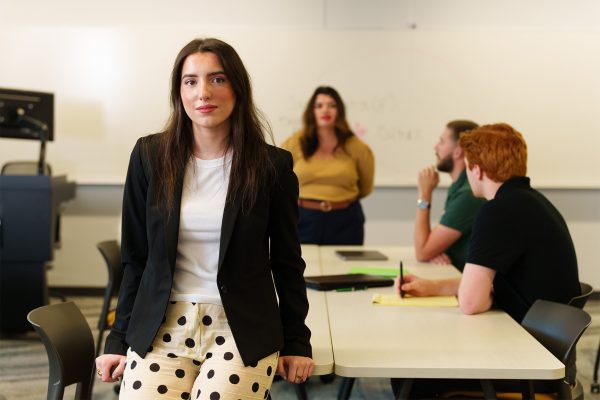Letter from the editor: Two years of grief and COVID-19
Editor-in-Chief of The Oakland Post Jeff Thomas.
This week marks the two-year anniversary of COVID-19 shutting down the United States and forever changing our lives. It also marks two years since I lost a dear friend of mine. I’m here with this letter to talk about my friend and extend a few words to all the people that have been impacted by the horrors of this pandemic.
The first time I met Dolores was at Friday-night karaoke in a dive bar in Madison Heights. I was the 24-year-old karaoke host, and she was a 70-year-old lady sitting at a high-top table with her husband Wayne.
My voice was shot that show. I used to have a lot of days at work where I’d spend my entire shift inhaling either concrete or drywall dust. My vocal cords were fried, so I kept it simple and sang the oldies.
I performed Otis Redding, Elton John and Johnny Cash throughout the night. Then I closed the show with the Rufus Wainwright version of “Hallelujah” at Dolores’ request. I sang that song for her many times after that, and it always seemed to mean a lot.
Her and Wayne closed the bar out with me that night. While I was cleaning up after the show, she called me over to their table and we got to talking. She told me about her son Wayne Jr. who’d passed away in the early 2000’s when he was just a teenager. With tears in her eyes, she said I reminded her a lot of him. She was shaking, I reached out and held her hand. From that point on we were friends and Dolores and Wayne were regulars at my show.
Whenever I put a microphone in Dolores’ hand she’d light up the bar room. Her favorite song to perform was “I Just Called To Say I Love You” by Stevie Wonder. And what an appropriate song that was for her, as she kept calling me long after I’d lost the hosting gig at that bar and we quit seeing each other every Friday night.
Like clockwork she’d call me Tuesday nights, Thursday nights and Saturday afternoons. I can’t tell you how many times I was sitting in a dirty work van after a long-summer day of installing fences just chatting it up with Dolores about whatever-the-hell.
To be honest, I was not usually the happiest guy back in those days. I had a lot going on in my personal life. I didn’t feel good mentally and physically I was hurting every day. There weren’t too many people checking in on me then either.
So we stayed in touch and still met up to sing every now and then. I even had the pleasure of going down to her house one weekend and working on all the flower beds around her house with my younger brother TJ.
Eventually her calls got less frequent. It was around Christmas 2019 that I learned Dolores had been in the hospital going in and out of comas. She pulled out of it and I started going to visit her in the nursing home that January. For a while, she seemed to be on the mend, but that didn’t last.
The final time I saw Dolores was Feb. 2020, shortly after her condition had flared up and caused her to spend a couple weeks at the hospital in and out of intensive care. After that incident, her health insurance downgraded her from a good care facility to a not-good care facility. I spent a couple hours late that night in a cold-dirty room, at her bedside reading her Anna Swir poetry and helping her navigate her smartphone so she could message her beloved grandkids.
In our final moments together, I bent down to hug her and felt her cold lips and clammy skin stick to the side of my face. I left Dolores, saying one last, “I love you too” before walking out of that room and outside into a late-February blizzard.
Ten days or so later I was sitting in Varner Hall, about halfway through Sam Srauy’s Intro to Media Communications class, when I got the Facebook message from Dolores’ daughter that she had passed away. Of course that was an awfully sad day. It was sad because I knew I’d miss my friend and because I knew that more than anything Dolores wanted to stay here with her family and friends.
Every time I visited her that winter while she was sick, we talked about how bad she wanted to get home and be with her family, how she wanted to be healthy for Easter and how she wanted to get back up on stage again and be able to sing for her friends. I promised her I’d be there at our old dive bar to sing with her when she was ready, a promise I still hope to keep one day.
I was proud, sitting in a Catholic church in Warren at Dolores’ funeral, to find out just how many people she had touched with her friendship. Unfortunately, in the last two years during this pandemic the world has lost a lot of Dolores-type people.
It is true that death is part of life. It’s hard, but it’s a reality that we all experience and do our best to persevere through. For people my age, a big part of growing up is outliving and losing the people who cared enough to help us carry on along our way.
Still, the suffering created by this pandemic is unlike anything we’ve experienced in our lifetimes. I don’t care how inconvenient it is for business or people with political agendas, one million deaths should not be dismissed or downplayed. One million lives have been lost forever to this pandemic because of calculated decisions. One million human beings erased off the face of the earth that had family and friends and people that needed them to be here. There’s no acceptable reason, no good excuse for the way our leaders let this pandemic ravage our country. Things didn’t have to be this way.
My heart aches for the people who have experienced the grief of COVID-19 first hand. It is one thing to have someone you love and care about so deeply pass away. It is another thing entirely to know someone you love suffered horribly at the end of their life and then died scared and alone. That’s the trauma our people are living through now.
And those of us lucky enough to have not experienced the loss of loved ones, have still lived through the isolation of this pandemic. We’ve endured the loss of casual friendships — the denial of the opportunity to meet someone like Dolores at karaoke night and make a friend that stays with you for life.
I’ve written more than I intended to here, but more than anything else what I want to say with this letter is — to all the people who feel bad and have had a hard time the past two years, I have felt bad and had hard times too. Please know that you’re not alone and it’s okay to feel the way you do.
I understand this has not been the most optimistic letter ever written by an Oakland Post editor, but in my opinion this is the reality of what we’re living through. I didn’t write this for sympathy or attention. I wrote it because I believe as writers it’s important always that we use our words to do our best to tell the truth.
For me the truth is that I love and miss my friends, and I wish things were better than they are. I hope desperately that we will see easier times in our lives and that people won’t have to hurt the way that they do. Human life has to matter. It’s important that we remember the people who helped us and do what we can to share the gifts they gave us with others.
I will leave you people with another thing that I know and believe to be true — which is that as terrible and painful as grief is, it is often the prism that renders all light in our lives possible. There is only joy in this world. It’s not as far out of reach as it seems.
Thank you for giving me your time.
Sincerely,
Jeff Thomas
Editor-in-Chief, The Oakland Post











Beth • Mar 13, 2022 at 10:12 AM
Thank you for sharing your story, Jeff. This moving letter brought tears to my eyes and hope to my heart.